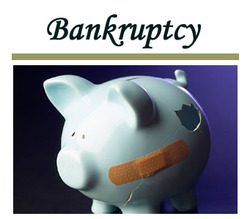 Most debts can be liquidated through a Chapter 7 bankruptcy, or reorganized through a Chapter 13 bankruptcy. However, there are a few debts that can altogether be non-dischargeable.
Most debts can be liquidated through a Chapter 7 bankruptcy, or reorganized through a Chapter 13 bankruptcy. However, there are a few debts that can altogether be non-dischargeable.
Some types of debts are always non-dischargeable, unless a debtor can demonstrate extraordinary circumstances to convince a court otherwise. One such debt includes any debt the debtor fails to list on his or her bankruptcy petition; unless the creditor had actual notice or knowledge of the bankruptcy.
Other debts that are generally always non-dischargeable include certain taxes, such as federal tax liens, payroll taxes or fraud penalties. Child support debt and other debts owed to a former spouse that arise from divorce are also non-dischargeable. Student loans, injury caused by DUI, and homeowner association fees are also included in this list.
Additionally, a court may deny a Chapter 7 bankruptcy discharge if the debtor fails to follow the court’s procedures and rules. If the debtor does fail to follow the procedures, the court may deny the bankruptcy petition altogether. This would mean a debtor would be denied the ability to discharge any debt.
In a Chapter 7 bankruptcy, the debtor does not have an absolute right to the discharge of all of his or her debts. A debtor must follow the provisions of section 727(a) of the Bankruptcy Code. This section outlines a list of reasons why the court may deny a discharge. If a debtor fails to follow these rules, a creditor or a trustee may object to the entire Chapter 7 discharge.
The court can also deny a Chapter 7 discharge if the debtor does not provide requested tax documents, does not complete a personal financial management course, or transfers or hides property in order to defraud creditors. The court can also deny a discharge if the debtor destroys records, commits perjury, or violates a court order.
A creditor may also be able to successfully object to a debt’s discharge. Creditors will often file a motion to have the court determine if a debt should be discharged or not. The debts will be discharged if the creditor does not raise the issue of discharge-ability, or the creditor does raise the issue but the court does not agree.
The most often disputed debts between a creditor and a debtor is credit card purchases for luxury goods. If the goods are owed to a single creditor, aggregate to more than $650, and incurred within 90 days of filing for bankruptcy, then the creditor may be able to convince the court not to discharge the debt. The debtor must prove he or she intended to pay the charges back or that the goods were not luxury goods.
A creditor is also likely to convince a court not to discharge the debt if the debtor has received cash advances aggregating to more than $925 obtained by the debtor within 70 days of filing for bankruptcy.
To learn more about how to discharge your debts, contact The Law Office of David Goldman, PLLC today.
 Jacksonville Bankruptcy Lawyer Blog
Jacksonville Bankruptcy Lawyer Blog


